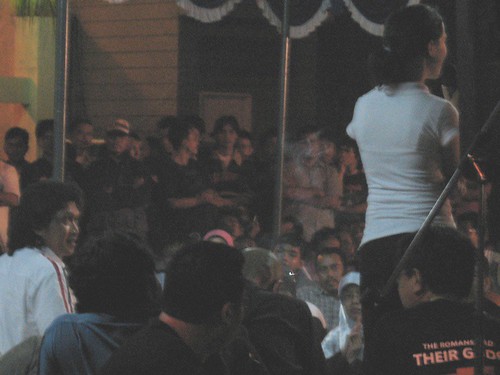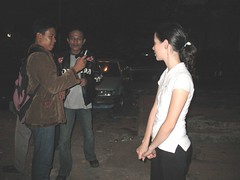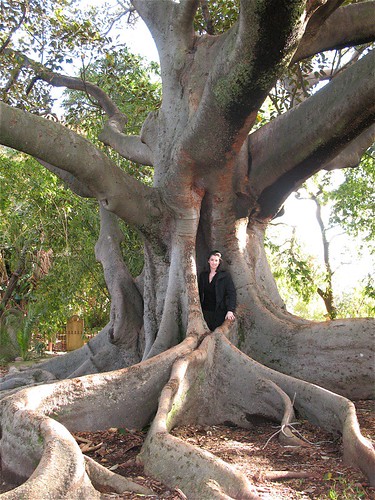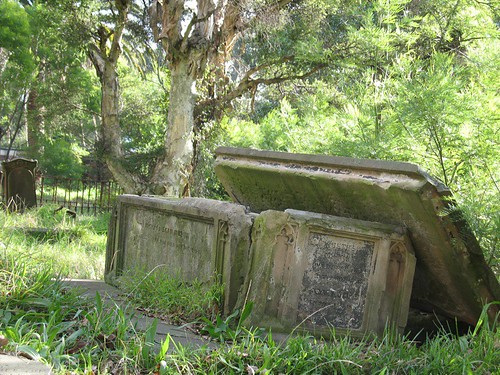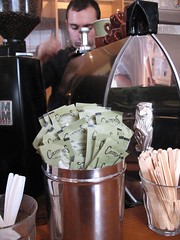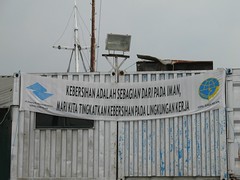Republik Mimpi
Jakarta, Indonesia
Twenty-five years ago, with a Masters in Buffoonery, RJ worked as a Ringling Bros clown. Later, he ran away FROM the circus & went to Harvard, where he got a PhD in theatre.
I think I'll leave his story at that.
We met this wonderful person in Indonesia as a fellow Fulbrighter. He graciously invited us to join him at the live broadcasts of several important television shows in Jakarta.
RJ was interviewing the fearless & inexhaustible Effendi Ghazali, once a Fulbright scholar himself at Cornell University, now writing, hosting & producing 3 different programs. Effendi’s shows are fast-paced, hotly topical, often funny (if not outright ludicrous), & always on the verge of government censure.
The one I saw taped was City Views, a more sedate, contemporary issues talk show. The night’s theme was domestic violence. The panel of Effendi & several experts sat in brightly lit couches. A super-sunny young pianist with a radio face & giant smile of tiny teeth played elevator music into & out from commercial breaks. On the other side of a partition, unnamed & filmed in shadowed profile, was a battered wife, a small, shy & nervous young woman in brown hijab.
Effendi casts a wide net. He’s pointedly criticized the Indonesian administration, poked at scandals of financial misconduct, beat the drum for a viable energy policy, for housing for the poor, for more affordable & available books, for flood relief....now a story on wife beating in Islamic households.
I sat on a chair about 12 feet in front of her while interns whispered into headsets & tried to pass around tic-tacks without making any noise. She was eloquent & simple, & slipped away the moment it was done.
MIMPI
E joined RJ on a further filming of Republik Mimpi—the Republic of Dreams—which I later saw on television on 20 May, the Day of National Awakening, E at my ear translating.
With some justice, Republic Mimpi is said to be the Indonesian version of The Daily Show. Not quite, but I can see what they mean. It is a political satire with sharp edges & ridiculous flares.
The rotating panel of characters are thinly-veiled mimics of actual Indonesian leaders, which is partially where all the heat comes from. Effendi hosts as their ‘communications adviser.’ Not only does the audience get a chance to hear (funny) ventriloquisms of “their leaders”, but they get to pose direct questions to those leaders. Deeply couched in jokes, the topics & the questions are real. More than a few times, Effendi said, issues addressed on the show were suddenly addressed in the actual government.
Because the government, for good & ill, is listening.
These shows are testing the edge of freedom of speech. Viewers in Indonesia can look to their success—that is to say, the shows' continued existence or their censorship—as bellwethers for their administration’s tolerance. These pretty much define how far Indonesians can go in their speech & no one has gone this far. So lots of viewers are tuning in not only to laugh, but to see what their own freedoms actually are.
(When I described The Colbert Report to an Indonesian Fulbright student, she couldn't believe it wasn't censured. Different world. There's a certain genius in the way the US government has, in my lifetime, tended to applaud (or only badmouth or ignore) its political satire artists. Or, in Colbert's case, actually invite him to perform at their own events)
‘Citizens’ of Republik Mimpi are very careful to call the show’s ‘president’ Gus Pur (not coincidentally pronounced: ‘poor’) instead of the actual Gus Dur, a recent ex-president. He’s played by a popular comic actor, Butet, who seems to be making a side career of lampooning presidents.
It's an old gambit: you can say what you like about the current regime so long as its set in a fable, or with some complete & critical difference. I think of the Croatian play: King Gordogon, which attacked the contemporary rise of fascism through the protective lens of a fairytale. Better, the wryly titled: “This Play Is Not Set in Indonesia” (really a play).
On the set, the humor is quick, politically incorrect & often improvised, the audience packed with students in colored blazers.
They all sing along with the show’s chorus:
We all know there are problems with the country
We don’t get all sad
Criticism is normal
We’re all born from dreams
EPILOGUE: Mimpi Commercials
One of the more distracting & unintentionally hilarious parts of Republik Mimpi are its commercials. Popular as it is, this is still a tough sell to sponsors who are hesitant to anger the government with their support. So their wide collection of small sponsors shows such things as:
Very clinical ads for condoms.
Cigarettes a-plenty.
Crackers: After a long day at work fishing in his little boat (already: I have never seen an ad like this), Dad walks back up the pier toward his waiting family—Look, Honey, kids, 2 fish!!—The family comes down to meet him & they all sit down on right there the ground to celebrate with dry CRACKERS. Ah, crackers. Mm-mmh!
And the best/worst: an ad for HOMOVITRON—an energy drink for pria (men)—played constantly on several large screens behind characters’ heads. The silent commercial was essentially a large male symbol whose arrow prodded at a cartoon jeans zipper until it came down. All of the actors had glasses full of Homovitron at their seats & would occasionally interject comments on their suddenly enhanced manliness & the fine, fine, FINE taste.


